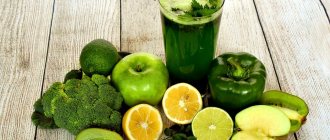On hot summer days it is very difficult to quench your thirst for a long time. Undoubtedly, water is the source of life, which you can always drink from. However, many people are not satisfied with this liquid and buy sodas or juices, which contain many harmful chemicals.
An alternative healthy drink is homemade lemonade. It is not only refreshing in the heat, but also reminiscent of the taste of childhood. We will discuss later in the article what the benefits of lemon are, to whom it is contraindicated, and its main harmful properties.
The benefits of homemade lemonade
In order to understand the beneficial properties of lemonade, you need to find out what it is made from. It's essentially an infusion of several lemons mixed with chilled water. Sugar is also added to taste. Lemonade contains the following components:
| Component | Quantity |
| Squirrels | 0.07 gr. |
| Fats | 0.0061 g |
| Carbohydrates | 2.38 gr. |
| Vitamin C | 2.93 mg. |
| Sodium | 13 mg. |
| Magnesium | 12 mg. |
| Phosphorus | 8 mg. |
If the drink is prepared at home, it has the following advantages:
- Instant thirst quenching, which prevents the body from becoming dehydrated;
- Normalization of water-salt balance;
- Energy restoration;
- Removing toxins and preventing the appearance of kidney stones;
- Strengthening the immune system, which prevents the occurrence of viral and colds;
- Reducing fever during colds;
- Elimination of metabolic disorders;
- Strengthening capillary vessels;
- Improving mood and reducing excitability;
- Increased performance, concentration and memory;
- Decreased appetite, which is especially important when losing weight.
The list of beneficial properties of the drink also depends on additional ingredients that are added to improve taste.
Who is recommended to drink homemade lemonade?
Homemade lemon drink, as mentioned earlier, has many beneficial properties. The list of contraindications is small, so lemonade is suitable for everyone who simply loves such fresh citrus fruits. It is especially important to drink a lemon drink for people with the following diseases:
- Anemia;
- Rheumatism;
- Scurvy;
- Gout;
- Urolithiasis disease;
- Atherosclerosis;
- Reduced stomach acidity;
- Cardiovascular diseases;
- Acute respiratory viral infection.
Composition of lemonade
Lemonade in the 17th century contained only a few ingredients. As a rule, it was lemon juice or tincture, as well as water. King Louis I of France was the first monarch in the history of lemonade to appreciate the drink. What’s noteworthy is that the composition of the lemonade was achieved thanks to a mistake that could have cost the court cupbearer his life. The man mixed up the barrels with wine and lemon juice, and when he noticed his mistake, it was already too late, because... the king was waiting for his wine.
Then the cupbearer added mineral water to the lemon juice. This is how the first lemonade turned out, the king fell in love with the drink, and the cupbearer not only remained alive, but also kept his job. The history of the creation of the first carbonated water is closely connected with the beginning of the industrial production of lemonade. The thing is that the industrialist Jacob Schwepp began to produce the first sweet soda for wide sale under the Schwepp & Co brand with lemon flavor.
At the beginning of the 19th century, carbonated lemonade became a top seller and enjoyed unprecedented popularity among customers. The first lemonade that was made industrially was called lemon-ginger ale. Nowadays, there are quite a few types of lemonades; some drinks contain other ingredients and components in addition to lemon.
Is lemonade harmful: contraindications for use
Although homemade lemonade contains many natural nutrients, if consumed in excess, the drink can harm a person. Basically, health can deteriorate if there are contraindications or recommendations for use are violated.
Contraindications to homemade lemonade are:
- Allergic reactions to the components of the drink;
- Increased stomach acidity;
- Presence of extra pounds;
- Chronic diseases of the digestive system;
- Diabetes.
Lemonade description. Lemonade - types, benefits and rules for drinking the drink
- Miscellaneous
- Admin
Delicious lemonade, prepared according to all the rules, is perfect for both a hot summer day and a family feast. Would you like to know what real lemonade is?

The benefits and harms of sweet water
The creation of the popular drink is attributed to a servant of the French king. The cupbearer mistakenly poured natural lemon juice into the sovereign's glass, which he broke with mineral water. To his surprise, the king liked the hastily prepared mixture. The drink became so popular that the Compagnie de Limonadiers company opened in France in 1670. Its peddlers offered lemonade to passers-by from barrels they carried on their backs.
Controversy surrounding the usefulness and harmfulness of the drink is caused by its composition. In low-quality products you can often find flavorings or flavor enhancers that have destructive powers. To solve the problem, just buy real lemonade.

In Italy, they decided to diversify the composition of the French invention and began to add tinctures of herbs and various fruits. Gradually, lemonade began to be prepared not only at home, but also in production. As a result, the following varieties of lemonade appeared on store shelves:
- "Citro";
- "Duchess";
- "Pinocchio";
- "Cream Soda."
It is usually sold in 0.5 liter glass containers or 1.5 liter plastic bottles.
Rules of use
When choosing products, you should take into account the shelf life - the longer it is, the less healthy the lemonade is. Regular filtered water will quickly become boring not only for children, but also for adults.
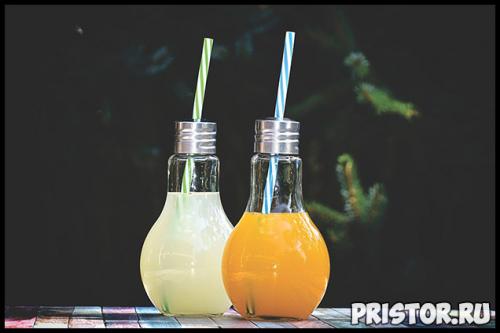
Therefore, a soft drink with a sour/sweet or spicy note will be very tempting. Lemonade is not just water mixed with citrus juice and sugar. This is how the drink is imagined in Europe, India, and North America. But the British, Irish and Australians call this any sparkling water with different flavors, not just lemon.
In the Middle East, it is common to add mint to sweet water. This is what the residents of Jordan, Libya, Syria and Israel quench their thirst on a summer day. After the sensational advertising of the drink on public buses, large producers of sweet water included it in their range.
- This is interesting - The benefits and harms of black tea for the human body
The traditional recipe involves the use of natural fruits, sugar and herbal infusions. It captivates with its unique taste and tonic and restorative properties. It continues to be prepared at home using rosemary and apples. But a number of factors should be taken into account. It is more profitable and smarter to entrust the preparation of the drink to professionals, and enjoy its taste yourself!
Beneficial and harmful properties of homemade lemonade for adults
In terms of composition, lemon drink is equally beneficial for both children and adults. But their side effects manifest themselves differently, and they occur more often in older people.
- When drinking lemonade, it is worth remembering that, like any liquid, it should not be ice-cold, but chilled (ideally at room temperature). This rule is observed so that the body does not experience stress and various processes are not disrupted.
- You should not drink lemonade concentrate. It is diluted with boiled or settled water, but not carbonated. Saturated liquid primarily damages the liver, kidneys, and stomach.
- The energy value of classic homemade lemonade is 50 kcal, so you should not drink the drink instead of a full meal. The drink helps fight extra pounds and satisfies the feeling of hunger.
- The acid in citrus fruits can damage tooth enamel, which leads to the development of diseases. Therefore, drink the drink through a straw.
What are the benefits of lemonade? Is lemonade a healthy drink?
Lemonade is one of the most popular drinks all over the world. It's inexpensive and easy to make. It has a great taste and lemonade quenches your thirst well. Is homemade lemonade good or bad? Of course it has more benefits!
Only one thing is important: you must drink it without sugar or sweeteners. Simply mix chilled water with fresh lemon juice and drink immediately. If you want to drink lemonade later, put the drink in the refrigerator.
Some people drink warm water with lemon juice early in the morning to flush out toxins. This drink strengthens the immune system and increases the metabolic rate. Choose what you like best.

Lemonade is good for the health of your skin and is good for eyelash growth. It improves digestion and has many other beneficial properties. This delicious, craveable drink contains vitamin C, iron, magnesium, calcium and antioxidants.
Even though lemonade is a little sour, lemon alkalizes your body. As a result, the pH balance is restored.
To make the drink even more tasty and healthy, add peppermint leaves, sliced cucumbers, orange juice or other active ingredients.
One cup of lemon juice (200 ml) provides about 187 percent of the recommended daily vitamin C intake.
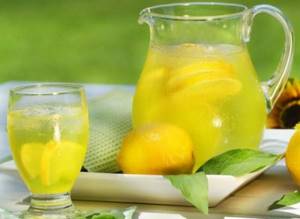
Lemonade is an excellent source of copper, potassium, vitamin B6, folic acid, thiamine and vitamin E.
Mix lemon juice with water and enjoy its aroma and taste.
Sweeten the drink with stevia or cinnamon.
This drink will improve digestion, eliminate constipation, improve immunity and stabilize blood pressure.
Harmful drink for a child
Children especially love homemade lemonade, even from an early age. Until the age of three, it is forbidden to even give the drink a try. Upon reaching the specified age and up to 6 years, it is allowed to gradually introduce lemonade into the diet (about a glass per day), but with a concentration of no more than 10%.
The main danger is harm to the children's stomach. During the period of growth, this organ is quite delicate and reacts instantly to similar foods and drinks.
Also, when drinking lemonade, an allergy may occur, so before drinking, the liquid is diluted as much as possible with boiled water.
How do flavors and dyes in lemonade affect children's health?
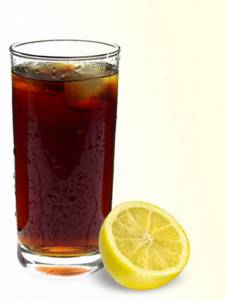
Almost every carbonated drink comes with flavors and colors. With the help of such ingredients, manufacturers make their products more attractive to potential consumers. In children, these components provoke allergies. In the simplest case, harmless urticaria occurs, and in severe cases, anaphylactic shock occurs. It is important to know that an allergic reaction often does not make itself felt immediately, but after a certain time during which the child consumed some drink. It all depends on the speed of the immune system's response.
Acids in lemonade
What benefit can lemonade have if it contains acids? This group of ingredients is dominated by citric and phosphoric acid. With the help of such substances, manufacturers extend the shelf life of drinks and balance their taste. Both acids are harmful. Citric acid destroys tooth enamel, resulting in caries.
Phosphoric acid is even more harmful - it causes calcium to be washed out of the body and, accordingly, high bone fragility. With a long-term lack of calcium, the likelihood of rickets increases. The gastrointestinal mucosa also suffers from acids. They cause gastritis and ulcers, inflammations affecting the intestinal tract.
Caffeine

This ingredient is a powerful stimulant for the central nervous system. Hence the invigorating effect of coffee, due to which the child becomes overly active, his sleep is disturbed, his blood pressure rises, his heart rate increases, and arrhythmia occurs. Add irritability to this list.
People, including very young children, develop a psychological and physiological dependence on caffeine. Over time, constant bursts of energy are required to maintain high performance. The younger the body, the stronger this dependence.
Carbon dioxide
This ingredient is harmless, but when included in water it negatively affects the functioning of the gastrointestinal tract. Under the influence of carbon dioxide, digestive juices are produced more intensively, which leads to an increase in their acidity, an increase in the likelihood of gastritis and flatulence.
Recipes for making lemonade from lemons
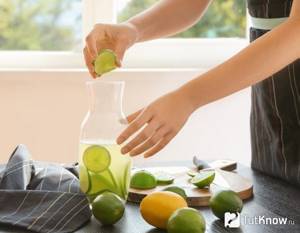
There are many recipes for making a soft drink. Berries and fruits are used as ingredients - most often apples and pears; sugar is replaced with honey. If it contains 1/3 fresh lemon juice, the drink can be called lemonade.
Homemade lemonade recipes:
- Classic
. Minimum ingredients - lemons or freshly squeezed citrus juice, water and sugar. It is better to mix in a mixer or food processor. Dilute freshly squeezed lemon juice (the taste will be more interesting if you squeeze at least 1 fruit without removing the peel) with water in a ratio of 1:4, add sugar - no more than 100 g, and cool. When serving, pour ice into each glass. - Homemade
. Cook sugar syrup from 1 glass of sugar and 1 liter of still water. Cool, add lemon juice, and blend until smooth using an immersion blender or whisk. Before serving, stir with ice water containing carbon dioxide. You can pour the prepared “concentrate” into glasses, and only then dilute it with soda. This is exactly the kind of lemonade that used to be sold on the streets. - Recipe for frozen lemons
. This drink quenches thirst better than fresh fruit drinks. Citrus fruits (8 pcs.) are washed with soda to remove the film from the peel that protects against rotting, and excess moisture is removed with a paper towel. Place in the freezer for 2-3 days to freeze the flesh and peel. Without defrosting, the unpeeled fruits are turned through a meat grinder and poured with 2 liters of boiled water. Leave to infuse for 8 hours, covered, on the refrigerator shelf. Strain and beat with sugar to taste. After freezing, the bitterness of the peel is felt only as an aftertaste, and even with an excess of sugar, it does not remain cloying in the mouth. - Recipe with mint
. The proportions of the ingredients are calculated as follows: 2 lemons per 1 liter of water. Peel off the zest in a thin layer using a vegetable peeler so that the bitter white part does not get in. The juice is squeezed into a separate container. The pulp is scraped out with a spoon. A bunch of fresh mint (50 g) is washed with cold running water and torn into pieces. Place the pulp, zest, sugar and mint into boiling water and cook for 1 minute. No more is needed, otherwise the beneficial substances will not be preserved. Strain through a sieve and pour the juice into the cooled liquid. Before serving, dilute with ice-cold mineral water or sparkling water. - Mint ginger lemonade
. Boil syrup from half a glass of sugar and 1 liter of water, add 2 cm of grated fresh ginger root, 20 g of mint leaves to the boiling mixture, stir, bring to a boil and cool. Squeeze fresh citrus fruits by removing the peel; you need 250 ml of juice. The syrup is filtered, diluted with mineral water, lemon juice is added, and cooled. Pour into glasses with ice. - Brazilian recipe
. The original is made from lime, but lemon turns out just as good. Remove the peel from 4 fruits, along with the white fibers, blend in a blender with 1/3 cup of cane sugar, filter through a sieve. Pour back into the blender, add 6 tbsp. l. condensed milk and mix again. Dilute to the desired consistency with mineral or sparkling water.






